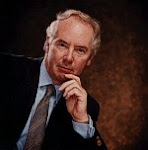 I went to University to read economics. But boredom intervened and I switched to Sociology because it is quite unnecessary to know anything whatsoever about money or arithmetic, or the value of anything. I am still convinced that Milton Keynes was one of the founding fathers of the new economic order. So in the woolly discipline of Sociology it was inevitable that I would shine like an excellent star. No knowledge of economics is required and no knowledge of anything else either. It was thus something of a foregone conclusion that the University of Kent should award me first class honours. I relished the term “first class” and proceeded to Liverpool University where I was to obtain my second first class Masters degree in Civil Design (Town Planning to ordinary folk). Then it was back to Kent College – not a University, I’m afraid – to obtain my diploma in Management Studies. They presented it with distinction – which, I think you will concur - is a notch above first class. Anyway there has been a great deal of talk about economics in recent days and inevitably it re-awakened my early fascination. In fact I cannot recall a time when events in Washington and Westminster were more fascinating that match of the day. It all seems to be going wrong at the moment but it will turn out fine in the last chapter – mark my words. I think we in Somerset will need to learn to value delivery and cost effectiveness far more in future. Remind me to get a book out of the library about it, or did we cut the library budgets this year? The remarkable savings which SouthWest One will make – the projected figures have risen from £200million to a staggering £150million – are certain to be of benefit to everybody. You can all rest assured that I am in complete control and have the academic qualifications to match the challenge with excellence.
I went to University to read economics. But boredom intervened and I switched to Sociology because it is quite unnecessary to know anything whatsoever about money or arithmetic, or the value of anything. I am still convinced that Milton Keynes was one of the founding fathers of the new economic order. So in the woolly discipline of Sociology it was inevitable that I would shine like an excellent star. No knowledge of economics is required and no knowledge of anything else either. It was thus something of a foregone conclusion that the University of Kent should award me first class honours. I relished the term “first class” and proceeded to Liverpool University where I was to obtain my second first class Masters degree in Civil Design (Town Planning to ordinary folk). Then it was back to Kent College – not a University, I’m afraid – to obtain my diploma in Management Studies. They presented it with distinction – which, I think you will concur - is a notch above first class. Anyway there has been a great deal of talk about economics in recent days and inevitably it re-awakened my early fascination. In fact I cannot recall a time when events in Washington and Westminster were more fascinating that match of the day. It all seems to be going wrong at the moment but it will turn out fine in the last chapter – mark my words. I think we in Somerset will need to learn to value delivery and cost effectiveness far more in future. Remind me to get a book out of the library about it, or did we cut the library budgets this year? The remarkable savings which SouthWest One will make – the projected figures have risen from £200million to a staggering £150million – are certain to be of benefit to everybody. You can all rest assured that I am in complete control and have the academic qualifications to match the challenge with excellence.Friday, 3 October 2008
Simple economics
 I went to University to read economics. But boredom intervened and I switched to Sociology because it is quite unnecessary to know anything whatsoever about money or arithmetic, or the value of anything. I am still convinced that Milton Keynes was one of the founding fathers of the new economic order. So in the woolly discipline of Sociology it was inevitable that I would shine like an excellent star. No knowledge of economics is required and no knowledge of anything else either. It was thus something of a foregone conclusion that the University of Kent should award me first class honours. I relished the term “first class” and proceeded to Liverpool University where I was to obtain my second first class Masters degree in Civil Design (Town Planning to ordinary folk). Then it was back to Kent College – not a University, I’m afraid – to obtain my diploma in Management Studies. They presented it with distinction – which, I think you will concur - is a notch above first class. Anyway there has been a great deal of talk about economics in recent days and inevitably it re-awakened my early fascination. In fact I cannot recall a time when events in Washington and Westminster were more fascinating that match of the day. It all seems to be going wrong at the moment but it will turn out fine in the last chapter – mark my words. I think we in Somerset will need to learn to value delivery and cost effectiveness far more in future. Remind me to get a book out of the library about it, or did we cut the library budgets this year? The remarkable savings which SouthWest One will make – the projected figures have risen from £200million to a staggering £150million – are certain to be of benefit to everybody. You can all rest assured that I am in complete control and have the academic qualifications to match the challenge with excellence.
I went to University to read economics. But boredom intervened and I switched to Sociology because it is quite unnecessary to know anything whatsoever about money or arithmetic, or the value of anything. I am still convinced that Milton Keynes was one of the founding fathers of the new economic order. So in the woolly discipline of Sociology it was inevitable that I would shine like an excellent star. No knowledge of economics is required and no knowledge of anything else either. It was thus something of a foregone conclusion that the University of Kent should award me first class honours. I relished the term “first class” and proceeded to Liverpool University where I was to obtain my second first class Masters degree in Civil Design (Town Planning to ordinary folk). Then it was back to Kent College – not a University, I’m afraid – to obtain my diploma in Management Studies. They presented it with distinction – which, I think you will concur - is a notch above first class. Anyway there has been a great deal of talk about economics in recent days and inevitably it re-awakened my early fascination. In fact I cannot recall a time when events in Washington and Westminster were more fascinating that match of the day. It all seems to be going wrong at the moment but it will turn out fine in the last chapter – mark my words. I think we in Somerset will need to learn to value delivery and cost effectiveness far more in future. Remind me to get a book out of the library about it, or did we cut the library budgets this year? The remarkable savings which SouthWest One will make – the projected figures have risen from £200million to a staggering £150million – are certain to be of benefit to everybody. You can all rest assured that I am in complete control and have the academic qualifications to match the challenge with excellence.
Subscribe to:
Post Comments (Atom)
























1 comment:
Alan
An interesting perspective, though as a similarly enthusiastic economist, I have to state my difference of opinion.
There are a number of economic theories and stances on Supply & Demand, Inflation and Unemployment, Keynesian and Monetorist, etc, however above all, in my opinion, is Kondratief Theory.
Kondratief identifed 70-80 economic long waves which were entwined with social, political and innovation activities. These long waves have been in existence and can be shown for over 300 years, and it is no conincidence that the current financial turmoil is occuring at around 70 years after the turmoil of the 1930's, which in turn occured 70 years after the 1861 problems: we are not entering a recession, we are entering a Depression, defined as over 10 years of decline in markets, asset value and overall wealth.
Kondratief goes on to predict numerous other events and trends, however knowing what history predicts for the coming decade can equip us to be ahead of the game, to anticpate and surpass our competitors, manage our business and buck the trend.
As a purchasing professional, the delivery of cost savings, negotiated added value and enahance service is my goal. Indeed, it will be challenging, however ever cloud has a silver lining. Savings will be needed, reduced expectation, financial tolerance and preparation for the unexpected is essential. Focus on negotiation, adding value and the management of risk, but above all be financially prudent.
Prudence will be the bridge over troubled waters.
Post a Comment